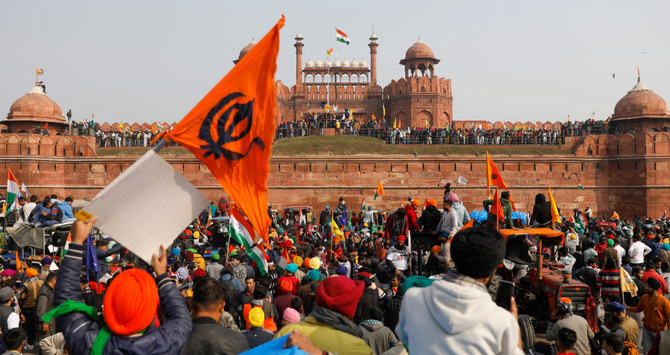DELHI: A protest march in Delhi on Tuesday by thousands of farmers demanding the repeal of three controversial farm laws turned violent, leading to one death and several injuries.
Clashes took place between farmers and police at several places in the national capital when farmers staged a “tractor rally” to coincide with India’s 72nd Republic Day.
Thousands of people from neighboring states stormed the heart of Delhi, breaking police barricades.
Elaborate security arrangements were planned by Delhi Police in anticipation of the march, but the rally turned aggressive, while some Sikh farmers entered the historic Red Fort and hoisted a Sikh religious flag.
“Our idea was not to disrespect India’s flag but to tell the Modi government that it should listen to our voice and repeal the three laws it has passed,” Gurmeet Singh, a protesting farmer, told Arab News.
The 16th-century Mughal fort holds significance for India. It is where the prime minister hoists the national flag on Independence Day every year on Aug. 15.
Police suspended internet access in several areas of the capital to control the chaos.
For the last two months, thousands of farmers and their families from across the country have held sit-in protests at different borders of Delhi demanding the repeal of three farm acts passed in September. They say the laws would leave them at the mercy of corporate giants and prevent the government from buying crops at guaranteed prices.
The government held 10 rounds of talks with farmers to resolve the issue and offered to suspend the new laws for 15 months in order to reach an agreement. However, farmers rejected the proposal and demanded an abrogation of the three laws before withdrawing the protest.
To intensify the rally, farmers decided to hold a tractor rally to mark India’s Republic Day.
Farmer leaders blamed the police for the chaos.
“Our protest was pre-planned and farmers were marching with their tractors, but the police created barriers at several places and used force to stop people,” Savit Malik of the Farmers’ Union told Arab News.
“The government wants to weaken the farmers’ movement by provoking violence at the protest march. But no matter what happens, farmers are not going to dilute their protests,” Malik added.
Some farmer leaders appealed to their supporters to maintain peace and stick to the predefined route of the march.
“I appeal to the people to maintain peace and not allow the protest to turn violent. This will weaken our movement,” Indian Farmers’ Union leader Rakesh Tikait told reporters in Delhi.
Media reports say that India’s Home Minister Amit Shah is holding a special meeting with security forces to take stock of the situation.
Political analysts blamed the government for the violence and chaos in the city.
Delhi-based analyst Nilanjan Mukhopadhyay told Arab News: “I believe that the government deliberately wielded this to happen this way. When they allowed the procession to come inside Delhi they knew what they were playing with and they wanted this to happen.
“The government has no other strategy except discrediting this movement which has been going on for months.”
The agitation is the biggest political crisis that the Narendra Modi led-Bharatiya Janata Party has faced in the last six years.
Mukhopadhyay said that the only way out of this logjam for the government is to call the movement anti-national, blame Sikh separatists, create problems for anybody who is supportive of it and “give a fresh task to the majoritarian
Hindu crowd.”
He said if New Delhi does not stop playing politics with the farmers’ protest, “it might have a major national security fallout.”
















